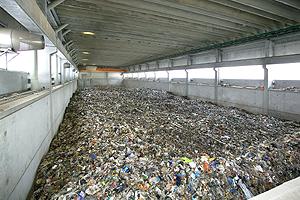Tom Drury, who took over from Michael Averill as chief executive last month (see letsrecycle.com story), said his company was now “well positioned” to help the UK meet its Landfill Directive targets through municipal waste contracts.
Mr Drury was commenting as he revealed preliminary financial results for the first half of the 2007/08 financial year. The results showed a 6% increase in headline profits before tax to £20.8m, dominated by a 23% increase in profits – to £17.1 million – in the company's Dutch operations.
The results also showed a 10% increase in overall turnover to £271 million for the six months up to September 30, 2007, compared to the same period in 2006.
UK
Reporting on Shanks' UK division, which saw a £71.8 million turnover in the last six months (£69 million in the same period in 2006) and a 25% increase in trading profits to £2.5 million, Mr Drury highlighted the company's mechanical biological treatment operations in East London and Dumfries & Galloway.
MBT involves mixed household waste being subjected to mechanical separation processes to remove recyclable material like glass and metals, with biodegradable material composted or digested to produce a stabilised landfill cover or fuel.
Mr Drury reported that Shanks' second MBT plant in East London is now operating at capacity, and that a price increase enacted in July for the long-term treatment contract with the East London Waste Authority was “confirming the contract's profitability”.
Shanks, which also operates a third MBT plant in Dumfries, said it is now receiving significant interest in the refuse-derived fuel produced from household waste at the MBT plants from energy intensive industries.
There continues to be significant interest from the cement and other energy intensive industries in the Solid Recovered Fuel produced by the MBT process.
Tom Drury, Shanks Group
Mr Drury said the “proven technological offerings” of his company meant the group was “well positioned within attractive growth markets”.
“It has a well-regarded brand, proven technological offerings in MBT, anaerobic digestion and composting, a solid balance sheet and the resources and skills to capitalise on increasing market opportunities,” he said.
Shanks is preferred bidder for a 25-year waste disposal contract with Cumbria county council, and the company is also bidding for similar local authority contracts centred around its MBT system, which uses Italian Ecco Decco technology.
MBT fuel
The company had been sending residue material from its MBT plants to landfills including one in Buckinghamshire, but is now working with cement companies to use the material as a replacement for fossil fuels within kilns.
A hiccup to this project has been the fire at the Castle Cement works in Padeswood, Flintshire, in July. This had affected disposal costs for the Dumfries and Galloway operation, said Shanks, but had not been related to the use of the waste-derived fuel.
Mr Drury explained: “There continues to be significant interest from the cement and other energy intensive industries in the Solid Recovered Fuel produced by the MBT process. Deliveries of SRF are increasing despite a temporary interruption of inputs to a cement kiln in North Wales following a problem at the plant unrelated to the processing of SRF.”
The Shanks chief executive added that the kiln was expected to be functioning again by the start of the next financial year.
Continent
The strong financial performance in the Netherlands has been helped by two acquisitions made in April 2007, which included a £3 million solid waste management firm – Kluivers – and a £21 million composting and anaerobic digestion business, Orgaworld. This latter business means new technology and expertise for Shanks, Mr Drury said.
Profits in the Netherlands were also boosted by the 2006 acquisition of Smink Beheer BV, a commercial and industrial waste collection and disposal firm.
In Belgium, where Shanks has a smaller presence than in the Netherlands, profits dropped 5% to £8.9 million, compared to a strong previous year in which the Shanks landfill benefited from municipal incinerator shut-downs.











Subscribe for free